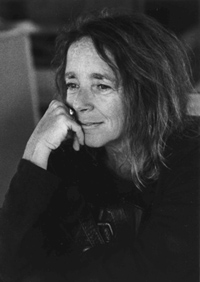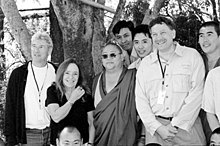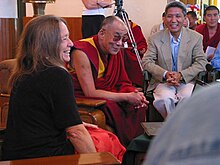
Lynn Margulis was an American evolutionary biologist, and was the primary modern proponent for the significance of symbiosis in evolution. Historian Jan Sapp has said that "Lynn Margulis's name is as synonymous with symbiosis as Charles Darwin's is with evolution." In particular, Margulis transformed and fundamentally framed current understanding of the evolution of cells with nuclei – an event Ernst Mayr called "perhaps the most important and dramatic event in the history of life" – by proposing it to have been the result of symbiotic mergers of bacteria. In 2002, Discover magazine recognized Margulis as one of the 50 most important women in science.

Elizabeth Helen Blackburn, is an Australian-American Nobel laureate who is the former president of the Salk Institute for Biological Studies. In 1984, Blackburn co-discovered telomerase, the enzyme that replenishes the telomere, with Carol W. Greider. For this work, she was awarded the 2009 Nobel Prize in Physiology or Medicine, sharing it with Carol W. Greider and Jack W. Szostak, becoming the first Australian woman Nobel laureate.

Randy Wayne Schekman is an American cell biologist at the University of California, Berkeley, former editor-in-chief of Proceedings of the National Academy of Sciences and former editor of Annual Review of Cell and Developmental Biology. In 2011, he was announced as the editor of eLife, a new high-profile open-access journal published by the Howard Hughes Medical Institute, the Max Planck Society and the Wellcome Trust launching in 2012. He was elected to the National Academy of Sciences in 1992. Schekman shared the 2013 Nobel Prize for Physiology or Medicine with James Rothman and Thomas C. Südhof for their ground-breaking work on cell membrane vesicle trafficking.
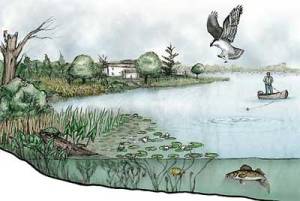
Religious naturalism is a framework for religious orientation in which a naturalist worldview is used to respond to types of questions and aspirations that are parts of many religions. It has been described as "a perspective that finds religious meaning in the natural world."

Stanley "Stan" Falkow was an American microbiologist and a professor of microbiology at Georgetown University, University of Washington, and Stanford University School of Medicine. Falkow is known as the father of the field of molecular microbial pathogenesis. He formulated molecular Koch's postulates, which have guided the study of the microbial determinants of infectious diseases since the late 1980s. Falkow spent over 50 years uncovering molecular mechanisms of how bacteria cause disease and how to disarm them. Falkow also was one of the first scientists to investigate antimicrobial resistance, and presented his research extensively to scientific, government, and lay audiences explaining the spread of resistance from one organism to another, now known as horizontal gene transfer, and the implications of this phenomenon on our ability to combat infections in the future.

Bruce Michael Alberts is an American biochemist and the Chancellor’s Leadership Chair in Biochemistry and Biophysics for Science and Education, emeritus at the University of California, San Francisco. He has done important work studying the protein complexes which enable chromosome replication when living cells divide. He is known as an original author of the "canonical, influential, and best-selling scientific textbook" Molecular Biology of the Cell, and as Editor-in-Chief of Science magazine.
The American Society for Cell Biology (ASCB) is a professional society that was founded in 1960.
The Institute on Religion in an Age of Science (IRAS) is a non-denominational society that promotes and facilitates the ongoing dialectic between religion and science. The Institute has held annual week-long conferences at Star Island in New Hampshire since 1954. The conference attracts about 250 members and non-members each year. The 1964 conference, for example, was attended by 215 conferees, with speeches by figures including Theodosius Dobzhansky.

John E. Heuser is an American Professor of Biophysics in the department of Cell Biology and Physiology at the Washington University School of Medicine as well as a Professor at the Institute for Integrated Cell-Material Sciences (iCeMS) at Kyoto University.
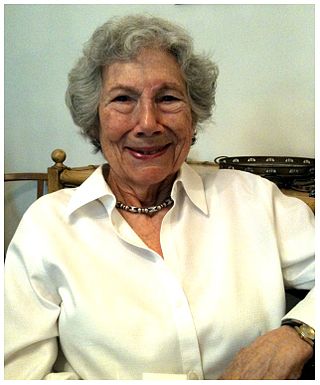
Evelyn M. Witkin was an American bacterial geneticist at Cold Spring Harbor Laboratory (1944–1955), SUNY Downstate Medical Center (1955–1971), and Rutgers University (1971–1991). Witkin was considered innovative and inspirational as a scientist, teacher and mentor.
Brigid L. M. Hogan FRS is a British developmental biologist noted for her contributions to mammalian development, stem cell research and transgenic technology and techniques. She is currently a Professor in the Department of Cell Biology at Duke University, Born in the UK, she became an American citizen in 2000.
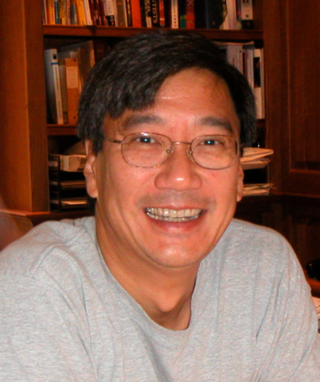
Peter S. Kim is an American scientist. He was president of Merck Research Laboratories (MRL) 2003–2013 and is currently Virginia & D.K. Ludwig Professor of Biochemistry at Stanford University, Institute Scholar at Stanford ChEM-H, and Lead Investigator of the Infectious Disease Initiative at the Chan Zuckerberg Biohub.
Mary Jane West-Eberhard is an American theoretical biologist noted for arguing that phenotypic and developmental plasticity played a key role in shaping animal evolution and speciation. She is also an entomologist notable for her work on the behavior and evolution of social wasps.
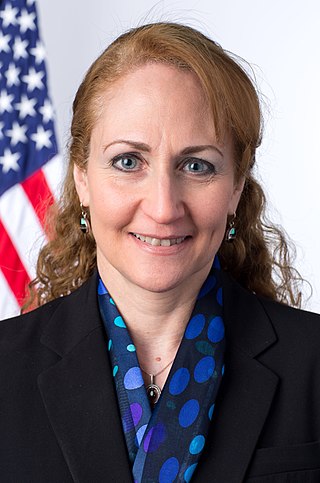
Jo Emily Handelsman is the Director of the Wisconsin Institute for Discovery at University of Wisconsin–Madison. She is also a Vilas Research Professor and a Howard Hughes Medical Institute Professor. Handelsman was appointed by President Barack Obama as the Associate Director for Science at the White House Office of Science and Technology Policy, where she served for three years until January 2017. She has been editor-in-chief of the academic journal DNA and Cell Biology and author of books on scientific education, most notably Scientific Teaching.
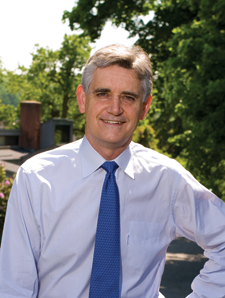
Bruce William Stillman, AO, FAA, FRS is a biochemist and cancer researcher who has served as the Director of Cold Spring Harbor Laboratory (CSHL) since 1994 and President since 2003. He also served as the Director of its NCI-designated Cancer Center for 25 years from 1992 to 2016. During his leadership, CSHL has been ranked as the No. 1 institution in molecular biology and genetics research by Thomson Reuters. Stillman's research focuses on how chromosomes are duplicated in human cells and in yeast Saccharomyces cerevisiae; the mechanisms that ensure accurate inheritance of genetic material from one generation to the next; and how missteps in this process lead to cancer. For his accomplishments, Stillman has received numerous awards, including the Alfred P. Sloan, Jr. Prize in 2004 and the 2010 Louisa Gross Horwitz Prize, both of which he shared with Thomas J. Kelly of Memorial Sloan-Kettering Cancer Center, as well as the 2019 Canada Gairdner International Award for biomedical research, which he shared with John Diffley.

Don W. Cleveland is an American cancer biologist and neurobiologist.
Laura Faye Landweber is an American evolutionary biologist. As of 2016, she is a professor of biochemistry and molecular biophysics and of biological sciences at Columbia University. Previously, she was a professor of ecology and evolutionary biology at Princeton University. She specializes in RNA-mediated epigenetic inheritance and molecular evolution.
Sangita Mukhopadhyay is an Indian molecular cell biologist, immunologist and the head of the molecular biology group at the Centre for DNA Fingerprinting and Diagnostics. Known for her studies on immunosuppression and infection biology, Mukhopadhyay is an elected fellow of all the three major Indian science academies namely the Indian National Science Academy, the Indian Academy of Sciences and the National Academy of Sciences, India. The Department of Biotechnology of the Government of India awarded her the National Bioscience Award for Career Development, one of the highest Indian science awards, for her contributions to biosciences in 2008.
Dr. Beronda Montgomery is a writer, science communicator, and researcher. In 2022, she moved to Grinnell College as professor of biology and vice president for academic affairs and dean of the college. Prior to Grinnell, Montgomery served as Michigan State University Foundation Professor in the Departments of Biochemistry & Molecular Biology and of Microbiology & Molecular Genetics. She was also a member of the MSU-DOE Plant Research Laboratory. Her research group investigates how photosynthetic organisms adapt to changes in their environment. Her scholarship extends beyond biology and into studying mentorship and faculty development to develop evidence-based strategies to foster equity and inclusion in academia. Together with Tanisha Williams and other members of the Black Botanists Week organizing committee, Montgomery co-founded and co-organizes Black Botanists Week.
Keith A. Crandall is an American computational biologist, bioinformaticist, and population geneticist at George Washington University, where he is the founding director of the Computational Biology Institute, and professor in the Department of Biostatistics and Bioinformatics.
